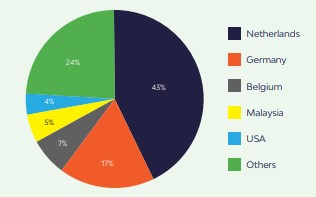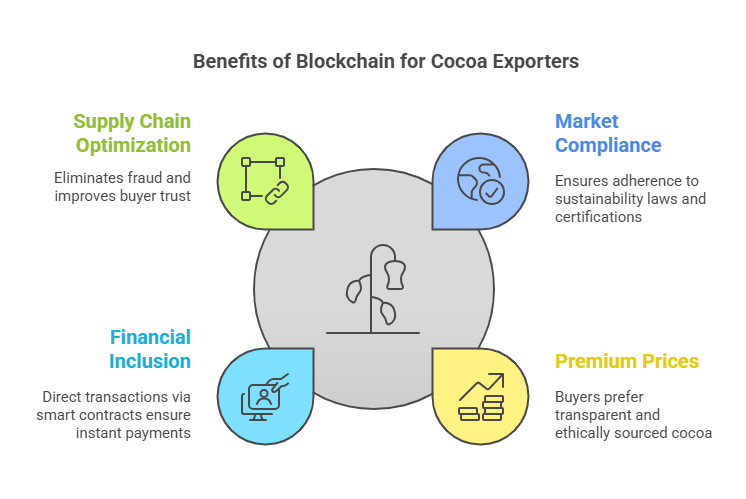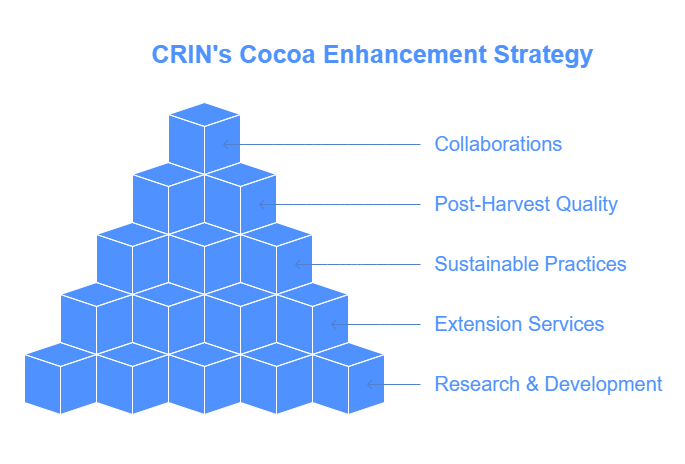Contact: +91 99725 24322 |
Menu
Menu
Quick summary: Explore the key challenges facing cocoa farming in Nigeria, including climate change, pests, financial hurdles, and infrastructure gaps. Learn how innovative solutions can help overcome these issues for sustainable growth.

Nigeria is a global leader in cocoa production. Cocoa farming in Nigeria now faces mounting obstacles—declining yields, fluctuating prices, and climate threats. Can technology, sustainable farming, and better policies revive cocoa farming in Nigeria?
Nigeria is the 4th largest producer of cocoa in the world, contributing approximately 5-6% of the global supply.
With over 90% of cocoa produced by smallholder farmers, issues like aging trees, poor infrastructure, and strict export regulations (such as EUDR) make survival harder. The result? Lower incomes, rejected exports, and a struggling supply chain. Let’s explore the key challenges and the path forward.
Key Takeaways
Cocoa farming in Nigeria isn’t just about growing beans—it’s a lifeline for over 300,000 smallholder farmers and a key contributor to the economy. Cocoa is one of the country’s top agricultural exports, bringing in billions in revenue and supporting livelihoods across rural communities.
Nigeria is currently the fourth-largest cocoa producer in the world, behind Ivory Coast, Ghana, and Indonesia. While its beans are highly valued in global markets—especially in Europe and Asia—farmers face serious challenges that threaten their income and long-term sustainability. Issues like climate change, aging trees, poor farming practices, and tough export regulations make it harder for Nigeria to compete.
In Nigeria, the cocoa market currently generates a revenue of US$0.41 billion and is projected to experience steady growth at a CAGR of 13.04% annually from 2023 to 2028
For Nigeria to stay relevant in the global cocoa trade, it must address these challenges. By investing in better farming techniques, technology, and sustainability, the country can not only increase production but also secure a stronger, more profitable future for its cocoa farmers. Let’s dive into the key obstacles and what can be done to overcome them.

Despite being one of the top cocoa producers in the world, cocoa farming in Nigeria comes with many challenges that make it hard for farmers to maximize their earnings. From unpredictable weather to fluctuating prices, these hurdles threaten the livelihoods of thousands of smallholder farmers
Nigeria’s cocoa farms are highly dependent on steady rainfall and mild temperatures, but climate change is making weather conditions unpredictable. Rising temperatures and erratic rainfall reduce yields and make cocoa trees more vulnerable to pests and diseases like black pod disease, which can destroy entire harvests.
The Solution: Farmers need to adopt climate-smart agricultural practices like shade-grown cocoa, improved irrigation, and soil conservation techniques to make their farms more resilient.
Many cocoa farms in Nigeria are filled with old, unproductive trees that no longer yield enough beans. Farmers often lack access to improved cocoa varieties that are more resistant to diseases and produce higher yields. On top of that, poor soil fertility and outdated farming practices further reduce productivity.
The Solution: Farmers need support to replant aging farms with high-yield, disease-resistant cocoa varieties. Training in better soil management and farm maintenance can also help boost yields.
Diseases like black pod and pests like cocoa mirids (capsids) can cause massive losses for farmers. Without proper pest control methods, many farmers watch helplessly as their crops get damaged, leading to financial losses and lower quality cocoa.
The Solution: Using integrated pest management (IPM)—a mix of natural pest control, improved farm hygiene, and limited pesticide use—can help reduce infestations and protect yields.
Farming is expensive, and many Nigerian cocoa farmers struggle to afford essential inputs like fertilizers, pesticides, and improved seedlings. Unfortunately, access to credit facilities is limited, and government support often doesn’t reach smallholder farmers.
The Solution: Microfinance institutions, farmer cooperatives, and public-private partnerships can help bridge the financial gap by providing affordable loans and farming inputs at subsidized rates.
Getting cocoa from farms to processing centers is a major challenge due to bad roads and poor logistics systems. Many farmers also lack proper storage facilities, leading to post-harvest losses and lower-quality cocoa. These challenges slow down the supply chain and reduce earnings.
The Solution: Investments in better transport networks, warehousing, and cold storage can help farmers preserve the quality of their cocoa and ensure smoother market access.
Global buyers now demand certified cocoa (Fairtrade, Rainforest Alliance, etc.), ensuring ethical sourcing and sustainability. However, smallholder farmers often struggle with compliance, as meeting certification standards requires training, documentation, and investment.
The Solution: Digital traceability platforms, like those provided by TraceX, can help farmers track their cocoa supply chain and meet international sustainability standards with ease.
Global cocoa prices are highly volatile, and Nigerian farmers often get low prices for their produce due to middlemen and unstable market conditions. Many struggle to predict earnings, making it difficult to invest in farm improvements.
The Solution: Farmers need direct market linkages to sell their produce at fair prices. Investing in value-added cocoa products (like cocoa butter or chocolate) can also help farmers earn more instead of just selling raw beans.
Despite the challenges, cocoa farming in Nigeria has huge potential for growth. By adopting modern solutions, farmers can boost productivity, secure better prices, and ensure sustainability.
The impact of climate change is undeniable, but farmers can adapt and thrive by using sustainable practices:
By adopting these techniques, farmers can increase yields while making their farms more climate-resilient.
Many Nigerian cocoa farms rely on old and low-yielding trees, leading to poor harvests. To fix this, farmers need access to:
By switching to high-yield and disease-resistant cocoa, farmers can increase productivity and profits.
Cocoa farming requires investment, but many smallholder farmers struggle to get loans. The solution?
With better financial support, farmers can afford fertilizers, better seeds, and farm equipment to improve yields.

Global buyers demand sustainable and ethically sourced cocoa, but meeting certification standards is complex and costly for farmers.
By using digital solutions, Nigerian cocoa can compete on the global stage with full transparency and trust.
Discover how a leading Nigerian cocoa trading company leveraged TraceX’s farm mapping solution to enhance transparency, comply with deforestation regulations, and drive sustainable sourcing.
Read the full case study to learn more!
Getting cocoa from farms to markets is one of the biggest hurdles in Nigeria due to poor roads, bad storage, and inefficient logistics.
By fixing supply chain issues, farmers can reduce waste, sell fresher cocoa, and earn higher profits.
Nigeria’s cocoa sector faces significant challenges in meeting the EU Deforestation Regulation (EUDR) compliance requirements. Many smallholder farmers lack geolocation data and proper documentation, making it difficult to prove deforestation-free sourcing. Weak supply chain traceability, limited financial support, and inconsistent infrastructure further complicate compliance. Additionally, the cost of certification and adapting to strict sustainability standards adds pressure on exporters. Without digital traceability solutions and regulatory support, Nigerian cocoa risks losing access to the lucrative EU market, affecting thousands of farmers and businesses. Addressing these challenges with blockchain, satellite monitoring, and policy interventions is crucial for sustainable exports.
The Nigerian firm improved data accuracy, ensured EUDR compliance, enhanced efficiency, and achieved full supply chain traceability, strengthening its commitment to quality and sustainability.
The TraceX EUDR Compliance Platform is a blockchain-powered solution designed to help agribusinesses and exporters meet the EU Deforestation Regulation (EUDR) with ease and transparency.
By adopting TraceX, Nigerian exporters can protect EU market access, build sustainable supply chains, and future-proof their agribusiness against regulatory risks.

The Cocoa Research Institute of Nigeria (CRIN) is a prominent research institution dedicated to the advancement of cocoa production in Nigeria. Established in 1964, CRIN operates under the Nigerian Federal Ministry of Agriculture and Rural Development. The institute is primarily focused on improving the quality and quantity of cocoa production through scientific research and the development of innovative agricultural practices.
CRIN’s contributions have made a significant impact on Nigeria’s position as one of the world’s largest cocoa producers. Through its research and initiatives, the institute plays a vital role in ensuring that Nigeria’s cocoa farming remains competitive, sustainable, and capable of meeting both domestic and international demands.
For Nigerian cocoa farmers, CRIN serves as an invaluable resource, enabling them to enhance their productivity and navigate the evolving challenges in the global cocoa market.
The challenges facing cocoa farming in Nigeria—ranging from climate change and pest infestations to financial struggles and poor infrastructure—demand urgent action. To ensure sustainable growth and maintain Nigeria’s competitive edge in the global cocoa market, it is crucial for stakeholders to adopt climate-smart practices, improve financial access, and embrace modern agricultural technologies like digital traceability and blockchain. By addressing these challenges head-on, Nigeria can unlock a future where cocoa farmers thrive, production increases, and exports continue to grow, benefiting both farmers and the broader economy.
Cocoa farmers in Nigeria struggle with climate change, aging plantations, pest and disease infestations, limited access to finance, and poor infrastructure for storage and transportation.
Solutions include adopting climate-smart farming practices, introducing disease-resistant cocoa varieties, enhancing financial access, and improving supply chain infrastructure.
Digital traceability platforms and blockchain technologies can help with sustainability certifications, ensure compliance with global regulations, and improve supply chain transparency, driving better market access for Nigerian cocoa.
